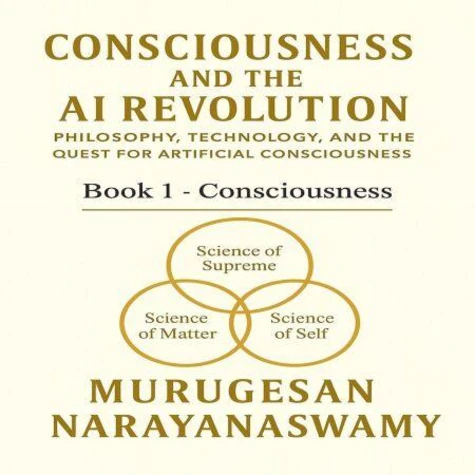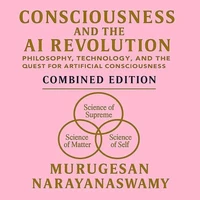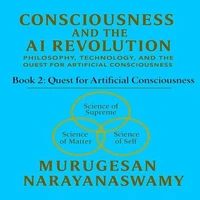Nouveauté
Consciousness and the AI Revolution: Book 1 - Consciousness
Par :Formats :
Disponible dans votre compte client Decitre ou Furet du Nord dès validation de votre commande. Le format ePub est :
- Compatible avec une lecture sur My Vivlio (smartphone, tablette, ordinateur)
- Compatible avec une lecture sur liseuses Vivlio
- Pour les liseuses autres que Vivlio, vous devez utiliser le logiciel Adobe Digital Edition. Non compatible avec la lecture sur les liseuses Kindle, Remarkable et Sony
 , qui est-ce ?
, qui est-ce ?Notre partenaire de plateforme de lecture numérique où vous retrouverez l'ensemble de vos ebooks gratuitement
Pour en savoir plus sur nos ebooks, consultez notre aide en ligne ici
- FormatePub
- ISBN8232706289
- EAN9798232706289
- Date de parution29/10/2025
- Protection num.pas de protection
- Infos supplémentairesepub
- ÉditeurHamza elmir
Résumé
Consciousness and the AI Revolution: Book 1 - Consciousness explores one of the deepest questions in science and philosophy: What is consciousness, and can machines ever possess it?Drawing on fifteen years of spiritual inquiry and over a decade in the IT industry, Murugesan Narayanaswamy offers a fresh framework that separates consciousness itself from what he calls "consciousness-stuff"-the physical and cognitive processes that reflect but do not constitute awareness.
Building on this foundation, he formulates his own triadic theory of consciousness, which unites the experiential, functional, and metaphysical dimensions of awareness into a coherent whole. This simple yet powerful distinction resolves many paradoxes that have long confounded both Western philosophy and modern neuroscience. Bridging ancient Indian thought and contemporary AI theory, the book challenges the dominant non-dualistic assumptions that blur subject and object, proposing instead a dual-layered understanding that preserves both scientific rigor and spiritual depth.
Accessible yet profound, the book invites readers-from philosophers and AI researchers to spiritually inclined thinkers-to reconsider the nature of consciousness, intelligence, and reality itself.
Building on this foundation, he formulates his own triadic theory of consciousness, which unites the experiential, functional, and metaphysical dimensions of awareness into a coherent whole. This simple yet powerful distinction resolves many paradoxes that have long confounded both Western philosophy and modern neuroscience. Bridging ancient Indian thought and contemporary AI theory, the book challenges the dominant non-dualistic assumptions that blur subject and object, proposing instead a dual-layered understanding that preserves both scientific rigor and spiritual depth.
Accessible yet profound, the book invites readers-from philosophers and AI researchers to spiritually inclined thinkers-to reconsider the nature of consciousness, intelligence, and reality itself.
Consciousness and the AI Revolution: Book 1 - Consciousness explores one of the deepest questions in science and philosophy: What is consciousness, and can machines ever possess it?Drawing on fifteen years of spiritual inquiry and over a decade in the IT industry, Murugesan Narayanaswamy offers a fresh framework that separates consciousness itself from what he calls "consciousness-stuff"-the physical and cognitive processes that reflect but do not constitute awareness.
Building on this foundation, he formulates his own triadic theory of consciousness, which unites the experiential, functional, and metaphysical dimensions of awareness into a coherent whole. This simple yet powerful distinction resolves many paradoxes that have long confounded both Western philosophy and modern neuroscience. Bridging ancient Indian thought and contemporary AI theory, the book challenges the dominant non-dualistic assumptions that blur subject and object, proposing instead a dual-layered understanding that preserves both scientific rigor and spiritual depth.
Accessible yet profound, the book invites readers-from philosophers and AI researchers to spiritually inclined thinkers-to reconsider the nature of consciousness, intelligence, and reality itself.
Building on this foundation, he formulates his own triadic theory of consciousness, which unites the experiential, functional, and metaphysical dimensions of awareness into a coherent whole. This simple yet powerful distinction resolves many paradoxes that have long confounded both Western philosophy and modern neuroscience. Bridging ancient Indian thought and contemporary AI theory, the book challenges the dominant non-dualistic assumptions that blur subject and object, proposing instead a dual-layered understanding that preserves both scientific rigor and spiritual depth.
Accessible yet profound, the book invites readers-from philosophers and AI researchers to spiritually inclined thinkers-to reconsider the nature of consciousness, intelligence, and reality itself.





